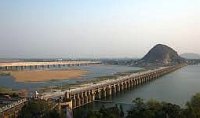Country's investments in the water infrastructure, institution and policy reforms is a must for growth and development. Discuss?
Civil Services Main Examination
General Studies (Paper - 3) : Model Question & Answers
 Question:
Economic growth is not a pre- requisite for solving water related problems, but
the country's investments in the water infrastructure, institution and policy
reforms is a must for growth and development. Discuss?
Question:
Economic growth is not a pre- requisite for solving water related problems, but
the country's investments in the water infrastructure, institution and policy
reforms is a must for growth and development. Discuss?
Financial Implication: Role in Economic Development
-
Economic growth is not a pre- requisite for solving water related problems, but the countries investments in the water infrastructure, institution and policy reforms is a must for growth and development.
-
Water security, Level of use of water in different sectors, Condition of water environment and Technological and institutional capacity of water sector are the water related factors pulling back the economic growth.
-
Water scarcity is originating from the geographic and temporal mismatch between freshwater demand and availability.
-
Apart from large scale loss of crops and property, livestock and human lives, water scarcity also results in morbidity due to water borne diseases.
Indian Scenario
-
The high average annual economic growth of India is not only supported by fixed capital but also by the natural resources.
-
By occupational structure India is an agrarian economy but its share of agriculture in total GDP has declined. The same precipitates a drop in demand for industrial goods and services.
-
Water use efficiency is very low in India and our overall water productivity as measured by constant 2005 US$ GDP per cubic meter of total freshwater withdrawal is much lower than the world average and even lower than the developing countries in Latin America and Caribbean and sub Saharan countries.
-
The ecosystem services like pollution assimilation are not considered in our System of National Accounts and hence it becomes difficult to understand the actual economic debt of the India economy.
-
Economic debt: According OECD, the economic debt is defined as the accumulation of past environmental impacts of natural resource depletion and environmental degradation, owed to future generations.
Possible steps
-
The diversification of the livelihood basket could be the best option for adaptation.
-
Adoption of water intensive crops throughout the year, low investment in surface water based irrigation system, unreliability of canal water supply, political interference in distribution of canal water and elite capturing- all of these lead to increasing dependence of groundwater for irrigation and are to be avoided and positive measures to be taken.
-
Storm water is a valuable freshwater resource and if managed properly, it could reduce dependence of cities on water supply from far away sources.
Measures already taken
-
The world economic forum 2016 announced water crisis as the largest risk in terms of potential impact.
-
Achieving universal access to improved water supply and sanitation facilities by 2030 is one of the sustainable development goals.
Conclusion: The concerted attempts to secure and maintain water sustainability, needs to take note of not only existing challenges but also the emerging concerns in a holistic manner. Investing in water, from both public and private sectors, can be good approach – improved water resources management and improved water supply and sanitation contributes significantly to production and productivity increase within economic sectors.
- Reference: YOJANA MAGAZINE (JULY - 2016)
- More GS Mains Model Q&A
- Report Error or Discrepancy
data-matched-content-ui-type="image_card_stacked"
Useful Tips & Articles
तैयारी कैसे करें? |
EXAM SUBJECTS |
STUDY RESOURCESDownload Free eBooks |



